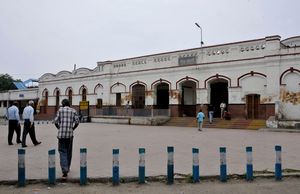Dear Anuja, the first ever Sikkim Arts and Literature Festival is being held in the historical town of Yuksom, a UNESCO world heritage site, from May 6 to 8.
Being a fauji child, who had spent four magical summers in the misty emerald mountains above the Teesta, I leapt upon the invite like a cheel (black kite) upon a chicken nugget.
Memories are tricky things—which is why it is wise to be wary of visiting the favoured haunts and golden places of our childhood. But this was Sikkim, bro! There’s no way I could not go.
Plus, I could visit a school friend who was commanding a unit in the area. It made sense to soak in the joys of living in a cantonment before all 62 of them are disbanded by GOI diktat, for being an ‘archaic colonial practice’, (just like a sari blouse and petticoat, but I don’t see anybody urging us to abolish those any time soon).
Seriously though, I cannot grasp the logic of this move! Cantonments are always the cleanest, greenest, safest area in a city, hands down. Haven’t all of us met at least one glib property agent who waxes eloquent about a particular property thus: ‘Madam, look, directly opposite is fauji area! It is protected! It is always clean and green, ma’am! It is a fail-safe investment, madam!’
Um… not anymore, I guess.
The point of the cantonment is basically that when soldiers dedicate their life in the service of the nation, and do not even know if they will come back home alive, it helps them sleep easy and function at full alertness knowing that their loved ones are safe and well-looked after.
The disbanding move is supposed to free the Army of the expense and headache of governing civic boards, and the money thus saved is supposedly being fed back into the defence budget specifically for military personnel, but there’s no transparency on that as yet.
When we were young, soldiers used to be called the ‘sons-in-law of Mother India’. Pardon the inherent patriarchy in the expression, but it simply meant that they got first dibs, that nothing was good enough for them.
Today, fauji canteens don’t even stock foreign made foreign liquor. Add to that the Agnipath scheme, with all its conditions and caveats. Add to that the worrying revelations made by Satya Pal Malik wherein the CRPF asked for aircraft to move a thousand plus troops, and were denied this request by the home ministry, which led to a massive convoy travelling by road, which arguably led to the Pulwama attack.
Add to that any number of ordnance and equipment issues, and it seems like we aren’t doing too much to protect the people who protect us... Anyway, I’m happy to report that my reunion with both Sikkim, and cantonments was a joyous one.
Sure, the rampant mountain lions who guard the two ends of the massive Teesta bridge were smaller than I remembered.
The river itself seemed browner and more sedate. The trees were dustier. The less said about the roads the better.
But high up in the mountains the hydrangeas were profuse and incredibly blue. The children were apple-cheeked and healthy. The music incredible. The resident audience intelligent. And the visiting writers adequate!
And most importantly, when I looked out of my windows at 5am in the morning, the pink, orange and gold peaks of Kanchenjunga were not smaller than I remembered. They were just as huge, and just as eternal. A reminder, perhaps, that diktats may come and diktats may go, but what is elemental endures forever.
editor@theweek.in


